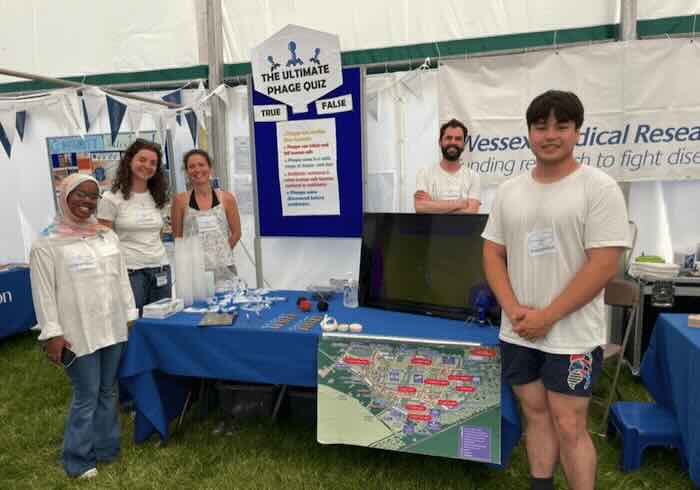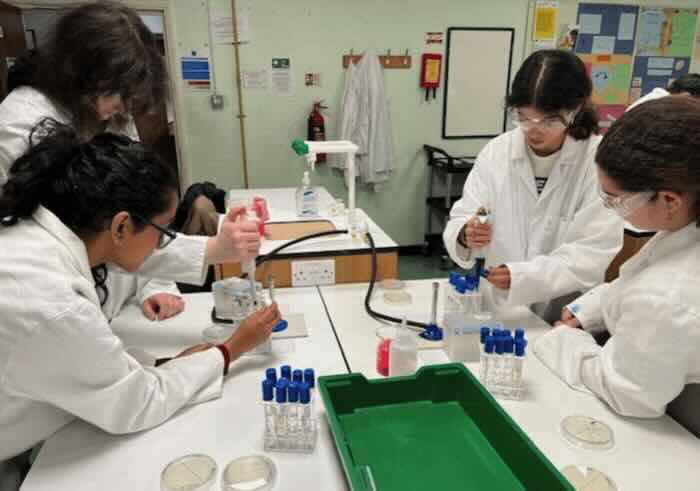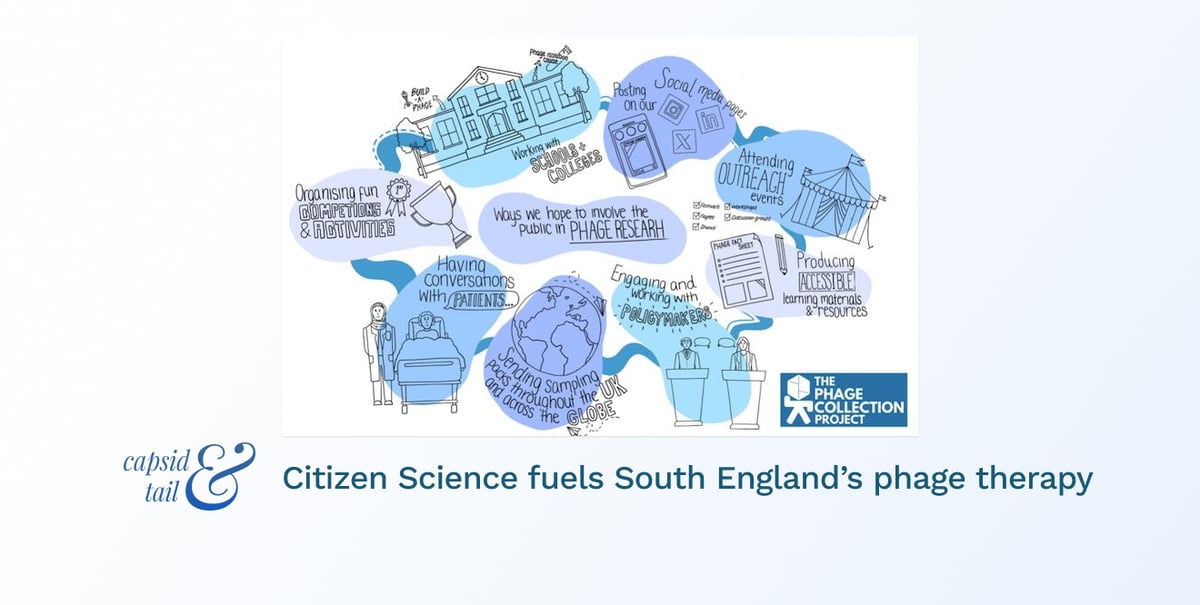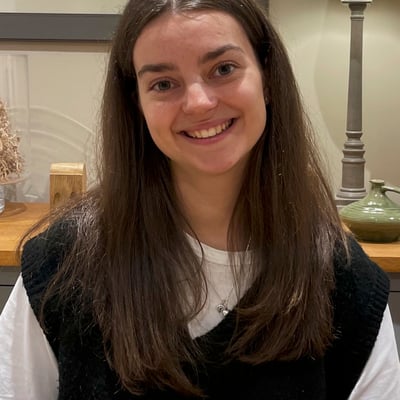What is the Phage Collection Project?
The Phage Collection Project is a citizen science initiative run by early career researchers (ECRs) at the University of Southampton. Created in 2023, the initiative was founded to advance phage therapy research and work towards overcoming the current challenges faced within the field. As a team we aim to support individuals struggling with resistant bacterial infections and educate the public on antimicrobial resistance (AMR). We are proud to be the first project led by junior scientists, standing on the shoulders of initiatives such as SEA-PHAGES in the US(1). As shown in the cover photo of this article, we hope to involve members of the public in our project in many ways, including engaging and organising discussions with policymakers about phage therapy. We are passionate about exchanging knowledge and advancing future technologies to prepare for the next generation of phage therapy.
Empowering the next generation of phage biologists
Our program provides a singular enterprise training to recent graduates with an interest in Public Health to gain valuable work experience. This is my story:
My name is Esme, and I recently graduated from the University of Southampton with an undergraduate degree in Biology. Throughout my studies, I developed a passion for Health Sciences, in particular AMR and the silent pandemic it is responsible for. As I gained more insight into this global health threat and learnt about the potential of phages in helping us combat this crisis, my fascination for these viruses grew! With that in mind, I took the role of Science Communicator at the Phage Collection Project. My day to day involves running and producing material for the project’s social media pages and website, as well as leading our public engagement projects. Additionally, with other members of the team I have helped to develop a survey to assess individuals’ willingness to accept phage therapy as a form of experimental medicine.
Our three major goals
A key goal of our project is to EDUCATE. In a recent publication by Innovate UK’s Phage Innovation Network, the document highlighted that a major barrier still faced in phage research is the lack of effective communication towards communities(2).
As a team we strive to create fun and memorable learning materials on phage therapy. We are driven by inclusivity, producing materials translated in a variety of languages, which lack scientific jargon and are accessible to all. We are also passionate about attending outreach events to connect us to members of the local community. Back in July we were fortunate enough to exhibit at the New Forest Show. This opportunity provided us with the chance to speak to individuals about our work and gain more understanding about their views on phage therapy.

The second major goal of our project is to build a comprehensive phage BIOBANK. The Phage Innovation Network emphasised that the UK is still in need of an extensive phage biobank(2), and this is something that we are working towards. So far, we have isolated 444 therapeutically relevant phages from across the South of England and France using two methods.
Firstly, we have created a Phage Isolation Course for sixth form colleges and schools, providing 16-19 year olds with the opportunity to collect and isolate phages. Back in February the American Society of Microbiology published a set of curriculum guidelines, which recommended that students should have the opportunity to experience laboratory learning(3). Witnessing the work that SEA-PHAGES has achieved in engaging over 50,000 students in their program(1), it has motivated us to provide more students in the UK with the opportunity to gain hands on lab experience and contribute to active phage research. Whilst our Phage Isolation Course benefits students and helps to increase our phage biobank, it also facilitates reverse socialisation. Reverse socialisation is a process in which adults gain knowledge and skills from younger members of society, increasing the older generations understanding and awareness of phage therapy.

More widely, we have developed a citizen sampling project to help increase our biobank. Like the Citizen Phage Library (CPL) in Exeter(4) we want to provide members of the public with the opportunity to collect their own phages. One unique aspect of our citizen sampling project however is that it is accessible to anyone worldwide. Citizens can request a sampling pack via our website which we can then post out to them, no matter their location. By globalising our sampling project, we hope to isolate a diverse range of phages, which target a wide variety of bacterial species, responsible for deadly infections worldwide. Like CPL and SEA-PHAGES, we want to share the information and phages we gain from our biobank with other research institutions. Only as a collective will we be able to advance phage therapy and make it available to the public.
Our final, and more ambitious goal is to ENGAGE with clinicians, stakeholders and policymakers. We are part of the BRC Southampton Experimental Unit, which is linked to the Faculty of Medicine. Our senior team of lecturers provide training to clinicians about how to isolate phages from patients’ bacterial infections and standardise rapid testing with new technologies developed at the University(5).
To lobby more investment for this underfunded research in the UK we work with Public Policy Southampton and the Centre for Science and Policy to help us engage with the UK government and industry leaders. With the data we collect from our willingness survey, we hope to show policymakers that there is an interest from the general population to use public funds to empower phage therapy in the UK.
Get involved!
We need your help to continue growing our biobank and the variety of strains it possesses. To get involved you can get your hands on a free sampling kit here and collect a test tube of water from your local area. You will get the opportunity to name any phages that we isolate from your sample and be kept up to date on the research we conduct on them. For postgraduates, we offer you the opportunity to link with our team to support you on your phage collection projects. To get in contact with us you can find our details on our website here.
We would also love your support to help us to gain more knowledge about the publics’ willingness to accept phage therapy. We would really appreciate you taking five minutes to complete our willingness survey and share it amongst your colleagues, friends and family! With this data we hope that we can shape the future of phage therapy in a way that considers people’s views and show policymakers that there is interest in phage therapy.
To keep up to date on our work you can follow our X, LinkedIn and Instagram pages and check out our website to learn even more about our project.
References
- Howard Hughes Medical Institute. Reimagining the undergraduate bio lab experience, and keeping students in STEMM. Phys.org. [online]. 2024, June 7. [Accessed 2024, September 11]. Available at: https://phys.org/news/2024-06-reimagining-undergraduate-bio-lab-students.html
- Adriaenssens, E. Antoniou-Kourounioti, M. Blackwell, A. Clark, J. Clokie, M. Edwards, J et al. Developing and delivering phage-based technologies in the UK. [online]. Innovate UK Phage Innovation Network. 2024. [Accessed 2024, September 11]. Available at: https://iuk.ktn-uk.org/wp-content/uploads/2024/08/Phage-Innovation-Network-report.pdf
- Allen, M. Boury, N. Frazier, A. Gillette-Ferguson, I. Horak, R. Kushnar, D et al. Recommended Curriculum Guidelines for Undergraduate Microbiology Education. [online]. American Society for Microbiology. 2024. [Accessed 2024, September 11]. Available at: https://asm.org/Guideline/ASM-Curriculum-Guidelines-for-Undergraduate-Microb
- Citizen Phage Library. Developing therapeutic phages to fight antimicrobial resistance with Citizen Science. [online]. [Accessed 2024, September 16]. Available at: https://www.citizenphage.com/
- iFAST Diagnostics. iFAST – Antimicrobial Susceptibility Testing. [online]. [Accessed 2024, September 16]. Available at: https://ifastdiagnostics.com/









